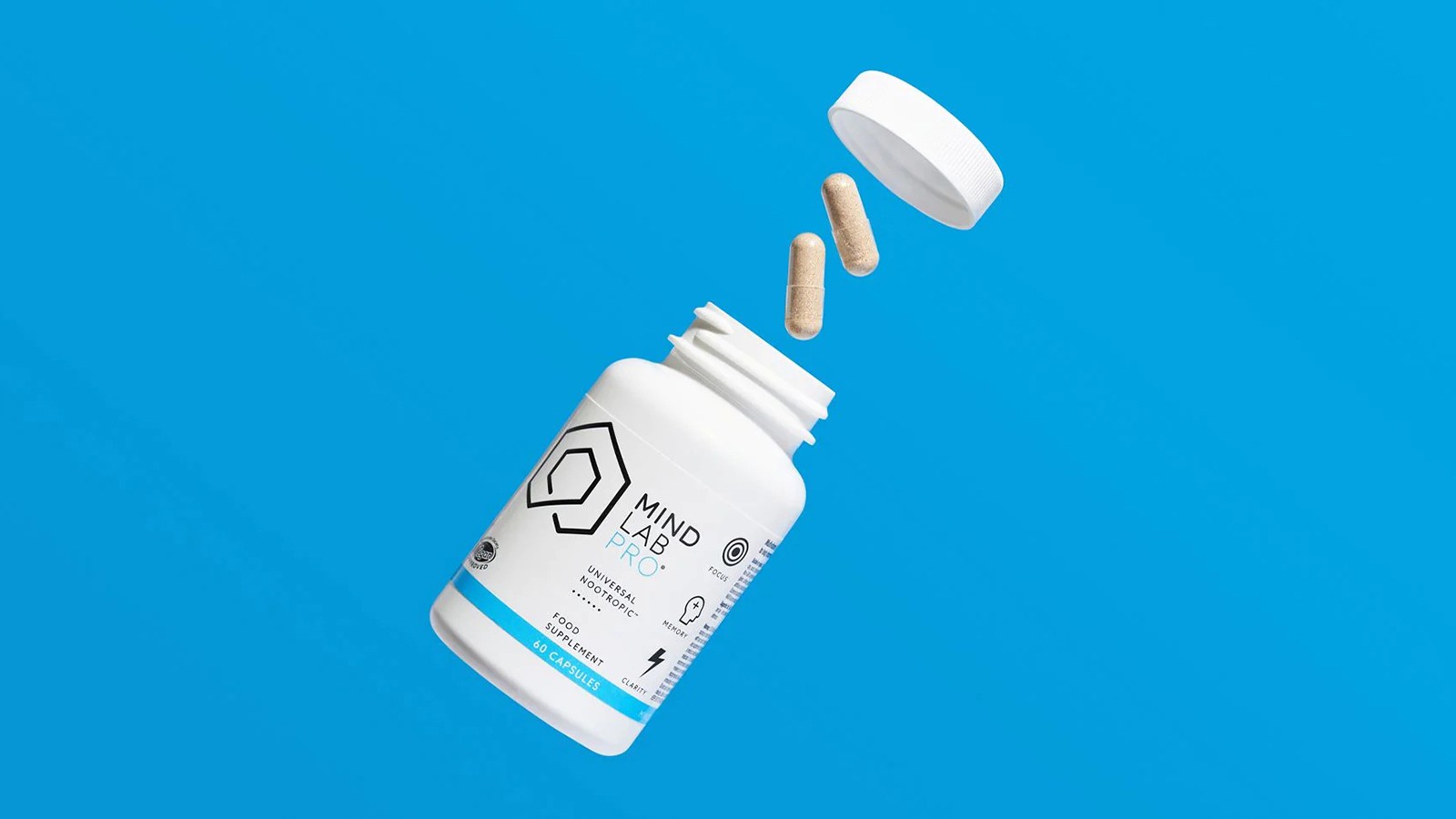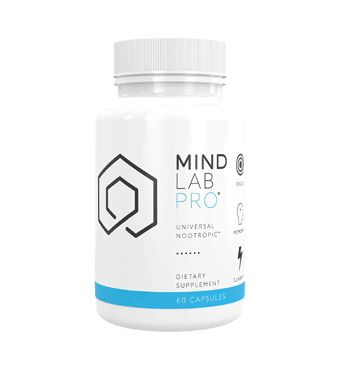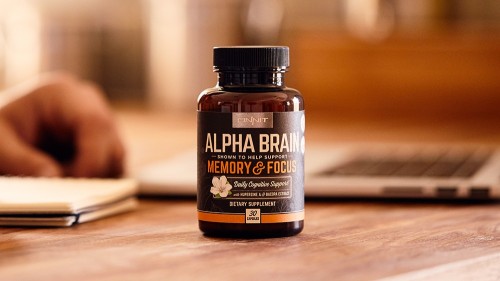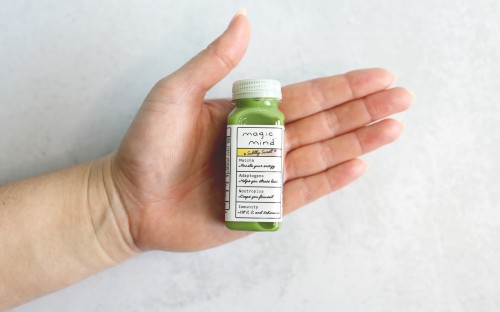WellnessVerge is reader-supported. We may earn a commission when you make a purchase through the links on this page. Learn more about our process here.
Mind Lab Pro Review: A Look Into Its Ingredients and Results
Last Updated on February 15, 2024
Medically Reviewed by Yasmine S. Ali, MD, MSCI
We reviewed Mind Lab Pro's ingredients, studies, and claims to examine the evidence behind this nootropic. This article provides critical takeaways on its benefits and downsides, effectiveness, safety, and how it compares to other supplements.


Key Highlights
- Mind Lab Pro contains 11 ingredients without stimulants that target different aspects of brain function, including energy, chemicals, circulation, regeneration, protection, and brain waves.
- An independent study found improvements in concentration, processing speed, and short-term memory compared to placebo after 30 days of use.
- Ingredients like citicoline, phosphatidylserine, and B vitamins have some research supporting brain health benefits, but not all are present in clinical doses.
- Mind Lab Pro has undergone quality testing, and no significant safety risks are reported. Still, the FDA does not verify the contents or efficacy of supplements.
- Some ingredients, like lion's mane mushroom, only have animal studies supporting their brain health benefits, making it difficult to translate results to humans.
Many people rely on a morning cup of coffee to jumpstart their day. But caffeine comes with side effects for some people, and it’s not always enough to get your brain cells firing on all cylinders.
That’s where non-stimulant nootropics, like Mind Lab Pro, step in. But can the ingredients in Mind Lab Pro really make a difference in your cognitive function and overall brain health?
If you’re curious about supplements that aim to optimize brainpower, here’s what you should know about Mind Lab Pro.
An Overview of Mind Lab Pro
Mind Lab Pro is a nootropic supplement aimed at boosting brain function. Produced by Opti-Nutra Advanced Nutraceuticals, the development of Mind Lab Pro started in 2015 with scientists in the US and UK. Since then, Mind Lab Pro has undergone four updates. After going through several updates, the latest version is called Mind Lab Pro v4.0.
Mind Lab Pro is considered a universal nootropic, meaning it’s suitable for a wide range of people.
Mind Lab Pro contains 11 ingredients that target different aspects of brain function. According to the manufacturer’s official website, these include (in their words):
- Brain energy
- Brain chemicals
- Brain circulation
- Brain regeneration
- Brain protection
- Brain waves
In short, Mind Lab Pro claims to enhance short-term “brainpower” and long-term brain health.
Mind Lab Pro’s serving size is two capsules daily, which you can take in the morning before eating. The company states you can take an additional 2 capsules around lunchtime if needed.
Pros and Cons
|
Pros
|
Cons
|
Potential Benefits of Mind Lab Pro
Most customer reviews of Mind Lab Pro noted enhancements in mental performance after taking Mind Lab Pro consistently for a couple of weeks. But looking at the research behind its ingredients helps weed out the placebo effect versus real results.
Here’s how the evidence breaks down for each of these claims about brain chemistry and overall brain health.
Focus
During an independent study through the University of Leeds, 110 participants were asked to complete various mental tasks before and after taking Mind Lab Pro or placebo for 30 days. The cognitive performance tasks evaluated reaction time, choice reaction time, anticipation, and verbal memory. The results show that Mind Lab Pro improved concentration and the ability to process information. (1)
Additionally, a meta-analysis of one of Mind Lab Pro’s ingredients, bacopa monnieri, concluded that it could potentially improve the speed of attention. (2)
Mental Clarity
Mind Lab Pro has three B vitamins (B6, B9, and B12) that can help support clarity. In a three-year-long study of 818 adults (ages 50 to 70), vitamin B9 supplementation was associated with faster mental processing speed (or quicker thinking skills). (3) If you can process information faster, you may feel like the “brain fog” or “cloudiness” that can slow you down has been cleared away. As a result, it’s easier to come up with ideas and understand concepts.
To see these benefits, getting an adequate daily dose of B vitamins is essential. (3) Mind Lab Pro has 160% of the daily value for vitamin B12, covering your total needs. However, it only provides 55% of B6 and 50% of daily B9 needs. Adding Mind Lab Pro to your day will help you get closer to achieving your daily requirements. The rest can come from food.
The N-acetyl L-tyrosine in Mind Lab Pro may also promote clear thinking. Tyrosine supplements have been shown to increase vigilance and reaction time during hot weather exercise (which is considered more stressful on the body than working out in a cooler environment). Tyrosine also supports thinking skills in stressful military settings. (4)
Memory
The independent research study on Mind Lab Pro found significant memory-related benefits compared to placebo. Mind Lab Pro enhanced verbal memory skills, meaning remembering and repeating what you heard. These findings support the claim that Mind Lab Pro benefits short-term memory.
Mind Lab Pro also provides 250 mg of citicoline daily for memory support. In another randomized controlled trial, 100 healthy men and women between 50 and 85 were provided 500 mg per day of citicoline for 12 weeks. The citicoline group showed improvements in overall memory, specifically episodic memory (a type of long-term memory).
Researchers concluded that citicoline might be beneficial in preventing memory loss and cognitive decline with age; however, the dose in the study was double what you get from Mind Lab Pro. (5) Therefore, it’s unclear if 250 mg would offer the same level of benefits.
Mood
Rhodiola rosea is a plant extract in Mind Lab Pro that may help improve mood balance and mental health. A review of nine studies (including two randomized controlled trials of people with major depressive disorder and seven open-label studies on mild depression) found a “possible antidepressant action” of Rhodiola rosea in adults. (6)
B vitamin supplements are also associated with mental health benefits compared to placebo, particularly for stress reduction. (3)
Long-Term Brain Health
One of Mind Lab Pro’s ingredients, phosphatidylserine, is an essential structural component of healthy nerve cells. Phosphatidylserine supports cognition, problem-solving, memory, language, and reflexes. (7) Mind Lab Pro provides 100 mg of phosphatidylserine per day.
Human trials lasting 60 days and 90 days have shown that 300-800 mg of phosphatidylserine supplementation per day improves performance on a range of tests for older adults with mild cognitive impairment. Multiple studies have demonstrated phosphatidylserine’s role in preventing, slowing the progression, and even reversing age-related dementia. (7)
The modest amount of phosphatidylserine in Mind Lab Pro may be sufficient to benefit healthy adults, but the jury is still out.
The B vitamins in Mind Lab Pro can also help preserve brain function. After 13 years on a supplement with B6, B9, and B12, women who didn’t otherwise consume many B vitamins in their diet were able to ward off mental decline. (3)
Itemized Ingredient Breakdown
Below, we’ll discuss each ingredient used in Mind Lab Pro to understand better what you would be consuming with this supplement.
Vitamin B6 (as NutriGenesis®)
Vitamin B6 (pyridoxine) is a water-soluble vitamin commonly found in meat and fish, fortified cereals, legumes, bananas, and starchy vegetables. Vitamin B6 is needed for the synthesis of neurotransmitters, to protect neurons, and to allow for faster communication between nerve cells. (8)
Vitamin B6 is essential for the many important functions of keeping the brain healthy. Though current research does not support vitamin B6 for preventing cognitive decline, preventing vitamin deficiency is essential for brain health. (9)
Vitamin B9 (as NutriGenesis®)
Vitamin B9, also known as folate, is a water-soluble vitamin present in various food sources. This vitamin plays an important role in synthesizing and breaking neurotransmitters, DNA synthesis, and regulation of nerve cells. (10)
Symptoms of folate deficiency are similar to those seen in vitamin B12 deficiency and include cognitive impairment, depression, dementia, nerve damage, and spinal cord problems. (11)
Folate is necessary to preserve brain health. Folic acid supplementation may not prevent cognitive decline, but it can reduce brain-related symptoms of folate deficiency in the body.
Vitamin B12 (as NutriGenesis®)
Vitamin B12 is a water-soluble vitamin that contributes to nerve health by helping protect nerves from damage. (8)
Deficiency of vitamin B12 can have effects on the brain, including impaired cognitive function, impaired neurotransmitter production, damage to nerves, and spinal cord injury.
Vitamin B12 supplementation may alleviate nerve pain and improve symptoms related to vitamin B12 deficiency. (12, 13)
L- Theanine (as Suntheanine®)
L-theanine is an amino acid found in tea and mushrooms. It is structurally similar to glutamate, the major neurotransmitter in the body.
L-theanine increases alpha-wave activity, which can improve cognitive function, promote relaxation, and decrease stress in amounts of 200 mg. (14, 15, 16)
Mind Lab Pro does not contain a clinically active dose in its normal serving size, but a full dose of L-theanine can be achieved if a double dose of this supplement is taken.
Citicoline (as Cognizin®)
Citicoline is the generic name of a compound called CDP-choline, which happens to be a precursor to phosphatidylcholine. Phosphatidylcholine is a phospholipid and precursor to the neurotransmitter called acetylcholine. This neurotransmitter is associated with improved cognitive function, working memory, and attention. (17)
Citicoline supplementation can be effective for brain health by increasing the synthesis of phospholipids, helping nerve cell regeneration, and may help restore activity after brain injury. (18)
As mentioned above, a clinical trial found that Cognizin®, the standardized extract of citicoline, improved memory performance amongst older adults with age-associated memory impairment after having 500 mg daily doses of Cognizin® for 12 weeks. (5)
Bacopa Monnieri
Bacopa monnieri is an herb used in Ayurvedic and Traditional Chinese Medicine to enhance cognitive function. The major active components of Bacopa monnieri include phytochemicals called bacosides, which have neuroprotective and antioxidant activities. (19)
Supplementation with Bacopa monierri improves cognitive performance, memory, and stress. (20)
Organic Lion’s Mane Mushroom fruit
Lion’s mane mushroom is an edible mushroom often found on hardwood trees. Lion’s mane contains several active compounds, including hericenones and erinacines, which can decrease inflammation and increase brain-derived neurotrophic factor (BDNF). (21, 22)
This may assist with neural development and the alleviation of brain-related symptoms from certain conditions and have anti-anxiety and anti-depressant-like activities.
However, most of the research available on lion’s mane for cognitive health is animal and cell studies, so results are difficult to translate to humans.
Phosphatidylserine
Phosphatidylserine is an abundant phospholipid in the brain needed to activate several signaling pathways to support the survival of neurons and nerve growth and development.
Supplementation appears to be effective in improving memory, decreasing stress, and improving sustained attention. (23, 24, 25)
N-Acetyl L-Tyrosine
L-tyrosine is an amino acid found in dairy, meat and seafood, avocadoes, nuts and seeds, and bananas. It is a precursor to dopamine and norepinephrine, which are both neurotransmitters. Depleted dopamine and norepinephrine can have a negative impact on behavioral performance and working memory. (26)
L-tyrosine supplementation can reduce neurotransmitter depletion, a process in which increased brain activity decreases dopamine and norepinephrine concentrations. As such, supplementation can also improve cognitive performance during short-time stress or cognitively demanding tasks if there is neurotransmitter depletion. (27, 27)
Rhodiola Rosea root
Rhodiola Rosea, also known as rosenroot, is a perennial flowering plant that has activity as an adaptogen. R. rosea supports brain health through a number of mechanisms, including antioxidant activity, improving mood, and preventing the breakdown of certain neurotransmitters. (28)
Additionally, studies suggest that R. rosea could be effective in alleviating mental fatigue, symptoms of depression, and help stress management by increasing energy production while regulating stress hormones. (29, 6, 30)
Maritime Pine Bark Extract
Maritime pine bark extract, or pycnogenol, comes from trees native to coastal Mediterranean countries.
Pycnogenol extracts contain several phenolic compounds, including catechins, flavonoids, and phenolic acids.
Maritime pine bark extract supports brain health by reducing oxidative stress, suppressing inflammation in the brain, increasing antioxidants, and helping after traumatic brain injury. (31)
Nitrites from the metabolism of pine bark extract can also stimulate nitric oxide production, improving cerebral blood flow. (32)
Other studies show that 100 to 150 mg of pycnogenol supplementation per day may improve attention, memory, executive functioning, mood, cognitive performance, and oxidative stress markers. (33)
Is Mind Lab Pro Safe?
There are no significant side effects or safety concerns with Mind Lab Pro’s ingredients. In addition, some of the ingredients are provided in lower doses with the supplement than the amounts used in scientific experiments where no major issues were noted.
This supplement is 100% vegan-friendly, free of major allergens, gluten-free, formulated with non-GMO ingredients, and free of caffeine, synthetic additives, artificial colors, and preservatives.
Opti-Nutra, the manufacturer of Mind Lab Pro, claims to have higher quality standards beyond current Good Manufacturing Practices (cGMP). Their manufacturing facilities meet certification standards for a number of entities and are NSF International GMP compliant and US Pharmacopeia (USP) certified.
Nonetheless, you should follow your primary care doctor’s medical advice, especially if you have diabetes, are pregnant, or are nursing. This supplement is only meant for adults ages 18 years or older.
Since the FDA doesn’t regulate dietary supplements, there’s no way to ensure the product’s contents. Mind Lab Pro has some third-party testing for its health effects but not to verify its ingredients.
Fortunately, the product has been around for several years without raising safety concerns. However, it’s always good to let your doctor know if you plan to try a new supplement.
Cost and Where to Buy
You can buy Mind Lab Pro directly from the manufacturer’s official website at the following prices:
- 1 Bottle (30-day supply): $69
- 2 Bottles (60-day supply): $138
- 4 Bottles (120-day supply): $207 ($51.75 per bottle) and includes 1 Bottle of MCT Oil Performance
Shipping is free on orders over $180. Otherwise, it’s $9.95 when shipped to the US.
The company offers its customers a 30-day performance promise. The first bottle qualifies for a full refund (minus shipping) if you’re unsatisfied with your results within 60 days of delivery.
If you ordered more than one bottle, you could still get a full refund if you didn’t open up your other bottles other than the first one. Otherwise, you will only be refunded for one bottle.
How Mind Lab Pro Compares to Alternatives
The nootropics market is a bit like the Wild West, with plenty of brands making big claims without strong evidence to back them up. The key advantage that Mind Lab Pro has over other nootropics is that it uses research-backed ingredients.
In addition, many nootropics use more ingredients in their formulation, which could increase the risk of side effects. Mind Lab Pro contains only 11 stimulant-free ingredients with a good safety profile.
Here’s how Mind Lab Pro compares to two popular nootropic supplements, Alpha Brain and Qualia Mind, that promise similar benefits.
|
Mind Lab Pro |
Alpha Brain |
Qualia Mind |
|
|---|---|---|---|
|
Regular Price (one-time purchase) |
$69 for a 30-day supply |
$69.90 for a 30-day supply |
$139.00 for a 30-day supply |
|
Discounted or Subscription Price |
$207 for 4 bottles ($51.75 per bottle) |
Subscribe-and-save option for 15% off |
50% off with subscribe-and-save ($69.50 for the 1st shipment, then $119/month) |
|
Shipping |
Free if you spend at least $180, otherwise standard shipping rates apply |
Free shipping for orders over $150 |
Standard US shipping is $7.98 & priority is $12.98, Standard international shipping is $12.98 |
|
Return Policy |
Full refund on the first bottle even if you use it all; after that, refunds only for unopened bottles |
30-day full refund for trial size and 90-day bottle qualifies with some stipulations |
100-day money-back guarantee for a full refund on the first purchase |
|
Key Ingredients |
B Vitamins (B6, B9, B12), Amino Acids (L-Theanine, N-Acetyl L-Tyrosine), Citicoline, Phosphatidylserine, & Herbal Extracts (Rhodiola Rosea, Maritime Pine Bark Extract Bacopa Monnieri, Organic Lion’s Mane Mushroom) |
Vitamin B6, 3 Amino Acids, Phosphatidylserine, Huperzine A, & 5 additional active ingredients/herbs |
Long list of ingredients from the following categories: Nootropics, Vitamins, Antioxidants, Adaptogens, Amino acids, Herbal Tonics, & Lipids |
|
Main Benefits |
Supports focus, clarity, memory, mood, and long-term brain health |
Supports mental speed, focus, and memory |
Enhances memory, cognition, focus, concentration, drive, productivity, and mental clarity |
|
Third-Party Tested |
Yes |
Yes |
Yes |
|
Clinical Studies |
Yes |
Yes |
Yes |
|
Gluten-Free |
Yes |
Yes |
Yes |
|
Vegan |
Yes |
No |
Yes |
|
Form |
Pill |
Pill |
Pill |
The Bottom Line
Mind Lab Pro v4.0 is an excellent option if you’re looking for a nootropic supplement with a transparent and clear list of effective ingredients. Some of its benefits might include remembering what you’ve been told (short-term memory) and better mental performance in stressful situations.
Mind Lab Pro has been through several updates. Based on our review of the current version of the product, it seems there’s some good research to support its effectiveness.
The cost of Mind Lab Pro is reasonable for the type of product you get. And if you don’t feel like it’s effective after taking it consistently for 30 days, you can get your money back on the first bottle (if you request it within 60 days).
There are no safety concerns to be wary about. The manufacturers say you can even double your dose if you want an extra boost. Over 2,000 customers on the website have reported benefits, like less brain fog and better control of their stress levels when taking Mind Lab Pro.
Final Word from an RD
If you’re unable to take nootropics or want to support your brain health regardless of what supplements you take, there are some things you can do daily.
Eating fruits, vegetables, and whole grains provides antioxidants that reduce inflammation and protect against free radicals damage in your body.
In addition, eating protein foods can help you get the B vitamins you need for neurotransmitter synthesis and brain health.
Getting enough sleep, managing your stress, and moderating your sugar intake can help prevent the highs and lows that deplete your mental energy levels. Also, getting your heart rate up in the morning with a quick exercise routine can help switch your brain function into high gear.
At WellnessVerge, we only use reputable sources, including peer-reviewed medical journals and well-respected academic institutions.
- Efficacy of the nootropic supplement Mind Lab Pro on memory in adults: Double blind, placebo-controlled study:
https://onlinelibrary.wiley.com/doi/10.1002/hup.2872 - Meta-analysis of randomized controlled trials on cognitive effects of Bacopa monnieri extract - PubMed:
https://pubmed.ncbi.nlm.nih.gov/24252493/ - Nutrients | Free Full-Text | Vitamins and Minerals for Energy, Fatigue and Cognition: A Narrative Review of the Biochemical and Clinical Evidence:
https://www.mdpi.com/2072-6643/12/1/228/htm - Nutritional Supplements and the Brain in: International Journal of Sport Nutrition and Exercise Metabolism Volume 28 Issue 2 (2018):
https://journals.humankinetics.com/view/journals/ijsnem/28/2/article-p200.xml - Citicoline and Memory Function in Healthy Older Adults: A Randomized, Double-Blind, Placebo-Controlled Clinical Trial - PubMed:
https://pubmed.ncbi.nlm.nih.gov/33978188/ - Rhodiola rosea L. as a putative botanical antidepressant - PubMed:
https://pubmed.ncbi.nlm.nih.gov/27013349/ - Phosphatidylserine and the human brain - PubMed:
https://pubmed.ncbi.nlm.nih.gov/25933483/ - B Vitamins in the nervous system: Current knowledge of the biochemical modes of action and synergies of thiamine, pyridoxine, and cobalamin - PMC:
https://www.ncbi.nlm.nih.gov/pmc/articles/PMC6930825/ - Vitamin B-Can it prevent cognitive decline? A systematic review and meta-analysis - PubMed:
https://pubmed.ncbi.nlm.nih.gov/32414424/ - Emerging roles for folate and related B-vitamins in brain health across the lifecycle - PubMed:
https://pubmed.ncbi.nlm.nih.gov/25371067/ - The neurology of folic acid deficiency - PubMed:
https://pubmed.ncbi.nlm.nih.gov/24365361/ - B12 as a Treatment for Peripheral Neuropathic Pain: A Systematic Review - PMC:
https://www.ncbi.nlm.nih.gov/pmc/articles/PMC7468922/ - Vitamin B12 Deficiency: Recognition and Management - PubMed:
https://pubmed.ncbi.nlm.nih.gov/28925645/ - L-theanine, a natural constituent in tea, and its effect on mental state - PubMed:
https://pubmed.ncbi.nlm.nih.gov/18296328/ - l-Theanine and caffeine improve target-specific attention to visual stimuli by decreasing mind wandering: a human functional magnetic resonance imaging study - PubMed:
https://pubmed.ncbi.nlm.nih.gov/29420994/ - Anti-Stress, Behavioural and Magnetoencephalography Effects of an L-Theanine-Based Nutrient Drink: A Randomised, Double-Blind, Placebo-Controlled, Crossover Trial - PubMed:
https://pubmed.ncbi.nlm.nih.gov/26797633/ - Frontiers | Cholinergic modulation of cognitive processing: insights drawn from computational models:
https://www.frontiersin.org/articles/10.3389/fnbeh.2012.00024/full - Citicoline - a neuroprotector with proven effects on glaucomatous disease - PubMed:
https://pubmed.ncbi.nlm.nih.gov/29450391/ - Insights Into the Molecular Aspects of Neuroprotective Bacoside A and Bacopaside I - PubMed:
https://pubmed.ncbi.nlm.nih.gov/29676230/ - Bacopa monnieri, a Neuroprotective Lead in Alzheimer Disease: A Review on Its Properties, Mechanisms of Action, and Preclinical and Clinical Studies - PubMed:
https://pubmed.ncbi.nlm.nih.gov/31391778/ - Chemistry, Nutrition, and Health-Promoting Properties of Hericium erinaceus (Lion's Mane) Mushroom Fruiting Bodies and Mycelia and Their Bioactive Compounds - PubMed:
https://pubmed.ncbi.nlm.nih.gov/26244378/ - Brain-Derived Neurotrophic Factor in Brain Disorders: Focus on Neuroinflammation - PubMed:
https://pubmed.ncbi.nlm.nih.gov/30117106/ - Soybean-derived phosphatidylserine improves memory function of the elderly Japanese subjects with memory complaints - PubMed:
https://pubmed.ncbi.nlm.nih.gov/21103034/ - Influence of phosphatidylserine on cognitive performance and cortical activity after induced stress - PubMed:
https://pubmed.ncbi.nlm.nih.gov/18616866/ - The effect of phosphatidylserine-containing omega-3 fatty acids on memory abilities in subjects with subjective memory complaints: a pilot study - PubMed:
https://pubmed.ncbi.nlm.nih.gov/21103402/ - Influence of nutritional tyrosine on cognition and functional connectivity in healthy old humans - PubMed:
https://pubmed.ncbi.nlm.nih.gov/30853567/ - Behavioral and cognitive effects of tyrosine intake in healthy human adults - PubMed:
https://pubmed.ncbi.nlm.nih.gov/25797188/ - Rosenroot ( Rhodiola): Potential Applications in Aging-related Diseases - PubMed:
https://pubmed.ncbi.nlm.nih.gov/30705774/ - Rhodiola rosea for physical and mental fatigue: a systematic review - PubMed:
https://pubmed.ncbi.nlm.nih.gov/22643043/ - Stress management and the role of Rhodiola rosea: a review - PubMed:
https://pubmed.ncbi.nlm.nih.gov/29325481/ - Neuroprotective effect of Pycnogenol® following traumatic brain injury - PubMed:
https://pubmed.ncbi.nlm.nih.gov/23059456/ - Facilitated cellular uptake and suppression of inducible nitric oxide synthase by a metabolite of maritime pine bark extract (Pycnogenol) - PubMed:
https://pubmed.ncbi.nlm.nih.gov/22569413/ - Assessing the Efficacy and Mechanisms of Pycnogenol® on Cognitive Aging From In Vitro Animal and Human Studies - PubMed:
https://pubmed.ncbi.nlm.nih.gov/31333448/








